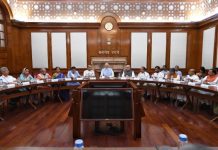 Preeti Devi speaks with the kind of maturity which can be rarely expected in a 16-year-old. A resident of Aligarh in Rajasthan’s Dholpur district, the girl is fighting the practice of child marriage inspired by her mother Rajkumari. “Girls usually get married early in these parts. It increases the risk of teen pregnancy which affects their health,” she said. Preeti is a Class 12 student in Aligarh’s Rajkiye Uchha Madhyamik Vidyalaya.
Preeti Devi speaks with the kind of maturity which can be rarely expected in a 16-year-old. A resident of Aligarh in Rajasthan’s Dholpur district, the girl is fighting the practice of child marriage inspired by her mother Rajkumari. “Girls usually get married early in these parts. It increases the risk of teen pregnancy which affects their health,” she said. Preeti is a Class 12 student in Aligarh’s Rajkiye Uchha Madhyamik Vidyalaya.
Her mother also tries to drill some sense in her neighbours. At the same time, she talks about the evil of dowry. “The two are linked. As many boys demand large sums of money as dowry, most families marry off their daughters early to reduce financial burden,” Rajkumari said.
She pointed out that after early marriage, girls become pregnant within a year and suffer from various complications. “I was married off at a very young age by my step mother after my mother died. But Preeti will be married only after 19,” she added.
However, every girl is not as lucky to have an understanding mother like Rajkumari. Shivani Shikarwar, a resident of Pavesura village, is in class 10. She informed that her neighbour, a girl named Rachna Parmar, got married at 15. Though Shivani tried to dissuade her, it was of no avail.
“I have told my parents that I want to study further and become a teacher. But if my parents stop my study midway, I will have no other option,” Shivani added.
School sessions
Amidst the pressure of child marriage, the Udaan initiative started in 2018 by Rajasthan-based non-profit Manjari Foundation in Dholpur is trying to change the prevalent social custom by holding sessions on gender, sexual and reproductive health and the use of contraception in schools. “As many girls drop out of school after Class 10 due to marriage, Udaan also touches upon the practice of child marriage and advises female students on how to approach parents in case they want to continue studies,” said Amit Singh, programme officer.
Udaan started on a pilot basis in 66 schools of the district. It has currently spread across 278 schools across all the five blocks of Dholpur. “Sadly I still do not see any difference in the attitude of most parents who marry off their girls early. Their apprehension is that the girls will run away with unsuitable boys,” Preeti pointed out.
Early marriage in Dholpur’s rural areas is common and most girls get married at 15-17 years. The National Family Health Survey 4 shows that in Dholpur 40.2 percent of rural women were married before 18 years and 9.4 percent women in the age of 15-19 were already mothers or pregnant at the time of the survey. As the district shares its border with Madhya Pradesh and Uttar Pradesh, the Udaan programme focuses on Dholpur. Many girls from the district are married off to boys from these two states.
In the initial days, some school teachers were not encouraging, but gradually understood the objective. At present, there has been a tie-up with the district administration to scale up the programme. Teachers have been selected from various schools to conduct sessions.
Principal of Rajkiye Madhyamik Vidyalaya in Badretha village of Bari tehsil in Dholpur Charan Singh Meena said a proposal has been taken to involve teachers in sessions. These teachers will be from science and social sciences background. From his schools two teachers have been selected.
Meena added students take a lot of interest in these sessions and the last session was held before March 14. “Some communities which are educationally backward marry off girls before 18. A few girls from my school were married off early while a few even attended school after marriage,” he added.
Both boys and girls attend the sessions separately. This is because some girls feel shy at discussing personal things in front of boys. A session lasts from 45-60 minutes in a week and there is no fixed day for it. A maths teacher at a government school in Badapura village, Swapnil, said many girls were married during the COVID-19 period.
“We try to guide them as much as we can. Some girls had prevented their marriages and so we can say that some positive outcome has been achieved. But we want that they should understand the difference between right and wrong,” she added.
District collector RK Jaiswal said though child marriage is prevalent in entire Rajasthan, sensitisation is helping to some extent.
Aiming for social change
 If Udaan only targets girls, then there will be no solution. So, it is also important to make boys understand about the pitfalls of child marriage. Only then, teen pregnancy can be avoided.
If Udaan only targets girls, then there will be no solution. So, it is also important to make boys understand about the pitfalls of child marriage. Only then, teen pregnancy can be avoided.
A boy named Anshu Sharma from Basai Dang village is in Class 12. “When my elder brother got married at 21, I informed my parents that I will not get married so early. Though there is no pressure on me, I do not want to get married before I get a job.”
He added that early marriage will create additional burden on us. But there has been a perceptible change in people’s attitude since Udaan started though many still get married while in school, Anshu explained.
Like Anshu, who is determined to get a job before marriage, Shivani Gaur, 17, wants to attend college. Gaur has not faced any marriage pressure despite having a younger sister and a brother. But she cites the example of her classmate Radha Gaur, who got married recently while in Class 10 during the lockdown. “I advised Radha to pursue high school but her father did not agree due to her family’s poor economic condition,” Gaur said.
Indira Pancholi of Mahila Jan Adhikar Samiti said child marriage is linked to economy and it also happens because society tries to exert control over women’s sexuality. It is expected that girls do not take any decision, she explained.
Usha Choudhary, who runs a social organisation Vikalp Sansthan in Udaipur, said that in Rajasthan women are subjected to a lot of gender-based violence. “We hold sessions in schools, community spaces and villages to spread awareness. It is imperative to talk about gender equality to see any perceptible social change.” Choudhary added that those girls who are forced to drop out of schools are at risk the most because they are the first ones to be married off.
“So, we try to ensure that students do not stop going to school. Girls married off early are sometimes deserted by their husbands later. We are also trying to change the mentality of the panchayat members as we want child marriage-free panchayats,” Choudhary explained.
Pancholi points out that marriage at an early age ensures total control over women. “But most girls do not have any option. They don’t think that their lives will change if they marry at 18 or 20. However, they have dreams of studying, working and earning for themselves,”
she said.
Asish Parashar joined Manjari in 2018. He is from medical background and it helped him. We talk about violence, gender, shame and contraception. We also talk on sex education so that boys and girls understand why child marriages should be avoided. Now, there are so many social gaps and that is why we conduct separate sessions with boys and girls.
letters@tehelka.com












